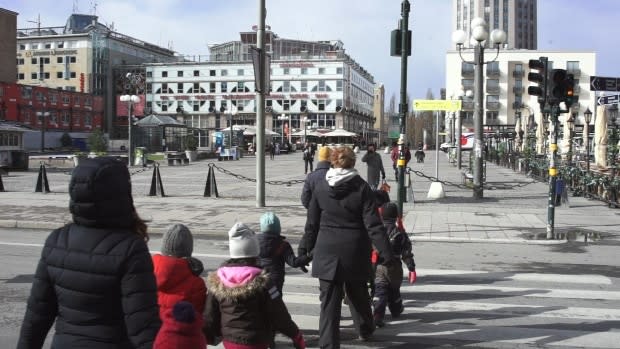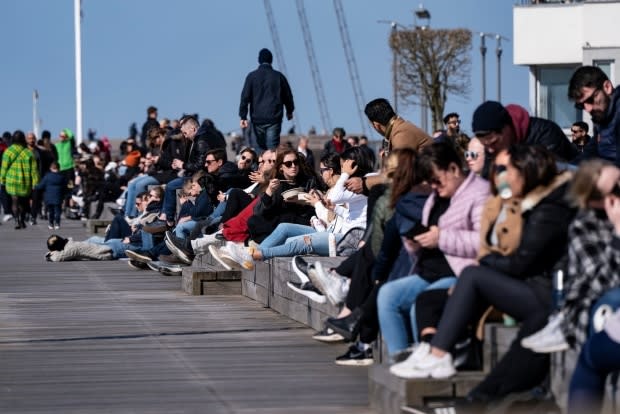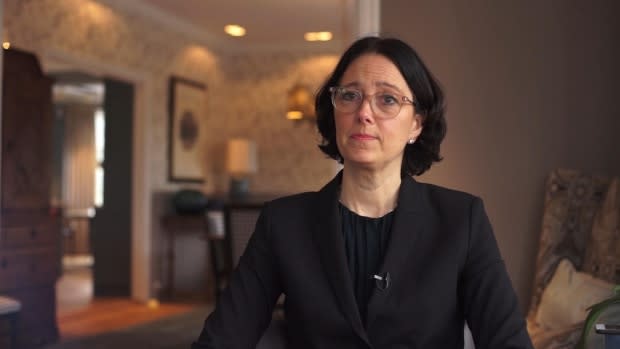Swedes' trust in government put to test as coronavirus deaths spike

Hakan Savllind 's coffee shop in Stockholm seems like a throwback to the way life used to be before the arrival of COVID-19.
There's a steady stream of customers entering the café, standing in a well spaced out line and waiting their turn to order cappuccinos or Americanos.
Afterward, some sit down, pull out their computers and chat with other customers sitting two or three empty tables away.
"I feel our customers are following the guidelines. They are keeping the distance. They are not sitting close to each other," Savllind, a 24-year-old barista, told a freelance producer who interviewed him in his cafe for CBC News.
"It's good for me to see they take the measures seriously. People are really careful."
Global outlier
So far, Sweden has been a notable outlier in the global fight against coronavirus.
Whereas schools and businesses have been ordered closed and near or total lockdowns are now enforced across much of Europe — and Canada — that's not the case in Stockholm.
While gatherings of more than 50 people have been banned, primary and preschools remain open — although public health officials have recommended that secondary schools and universities switch to distance learning.
Daycares are open as well, as are hairdressers, gyms and many retail stores.
The country's centre-left government led by Prime Minister Stefan Lofven has issued guidelines on social distancing and behaviour aimed at limiting the spread of the virus, and it has expected that Swedes will abide by them.

"I think the measures are enough," said Tures Stronberg, a 59-year-old technical consultant from Stockholm, who spoke to our producer in the capital.
"Most people take their responsibility seriously not to spread the virus — so I think we will struggle through this. I'm not worried."
There were hints this weekend, however, that despite the public pronouncements of faith in the strategy, Sweden's government may be setting the stage for an about-face.
Swedish media reported the government wants parliament to grant it sweeping powers to impose new emergency measures, such as ordering businesses to close and closing down transit.
That said, broadcaster SVT also reports that the plan has been retooled, and the legislation will still give parliament a say in any new restrictions.

Officials at Sweden's health agency say they are in the midst of a fight against COVID-19 that they believe will be a lengthy one.
Sustainable measures
In an interview with CBC News, deputy chief epidemiologist Anders Wallensten said people will eventually ignore stay-at-home orders if they are too stringent, so it's better to adopt measures that can be sustained over a long period of time.
Trust in government is also key, he says.
"We also consider that most people in Sweden are very good at heeding advice from the authorities, and therefore, maybe there's a difference in the need for having laws about certain things. So that may be a difference between Sweden and other countries."
For a time, the strategy appeared to be succeeding as Sweden's COVID-19 cases remained on par with its neighbours, even as many businesses — even ski resorts — remained open late into March.

But in the past few days, there's been a dramatic spike in deaths. Reuters reported Monday that Sweden has had 477 coronavirus-related deaths (an increase of 76 deaths from Sunday) and 7,206 cases (up by 376 from Sunday).
Per capita, that's more than three times as many as next door in Norway, which has enforced much stricter quarantine measures.
Even more worrying, the health agency also confirms cases of COVID-19 have now been detected in one-third of the nursing homes in the capital city Stockholm.
WATCH | A range of voices from Sweden explain how they view the government approach on COVID-19:
Early on in the coronavirus outbreak, Britain's government attempted to take a similar permissive approach, with public health authorities initially suggesting it might be possible to manage the outbreak by protecting older, more vulnerable populations while letting younger people get infected.
The strategy was abandoned after a report published by Imperial College of London in the U.K. in mid-March suggested Britain's emergency wards and ICU beds would quickly be overwhelmed by patients.
Modelling from the report suggested that with no mitigation measures, half a million people could die in the U.K. by August, and even with moderate efforts there could still be a quarter of a million deaths.
Health system stable
Still, as late as Friday, Wallensten was suggesting there are no imminent plans for Sweden to change strategy.
"I have said no one can be confident about how this disease affects their country — but we are doing what we can to make sure that the health-care system can handle it."

Many other health professionals have urged the country's prime minister to fall into line with other nations and impose much stricter stay-at-home rules.
"I think that all other countries that are closed down are going to be able to manage their health-care problems better," said Cecelia Söderberg-Nauclér, a infectious disease expert with 30 years experience studying immune systems.
She was one of 2,000 medical professionals who recently signed a petition urging Sweden's government to replace the voluntary measures with enforceable ones.
"The problem is this virus is spreading so fast, which means there are too many people who get sick at the same time and you collapse the hospitals, so it just doesn't go together," Söderberg-Nauclér told CBC News in an interview.
"I usually say that this virus is more a dangerous virus for the society than it is for the individual."
Children 'are an engine'
One crucial step she says would be to close all of Sweden's schools immediately. While children appear to be less affected by the COVID-19 virus than adults, they act as carriers, she says.
"They can still be a driver of the whole infection in society. They are an engine, basically."

Dr. Lynora Saxinger, an infectious disease specialist at the University of Alberta, says Canadian provinces have rejected the more permissive Swedish approach, because most public health experts see it as inherently risky.
"The difference between a complete lockdown and a slightly permissive effect is really profound. So you are taking a big risk trying to fine tune that," she said in an interview.
"It seems like you're playing chicken with the fact there is finite [medical] resources."
WATCH | Freelance journalist Rick Wasserman outlines how Sweden's approach differs from that of other Scandinavian countries:


